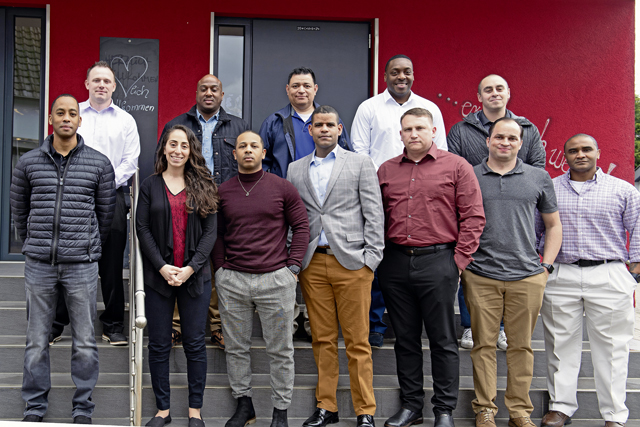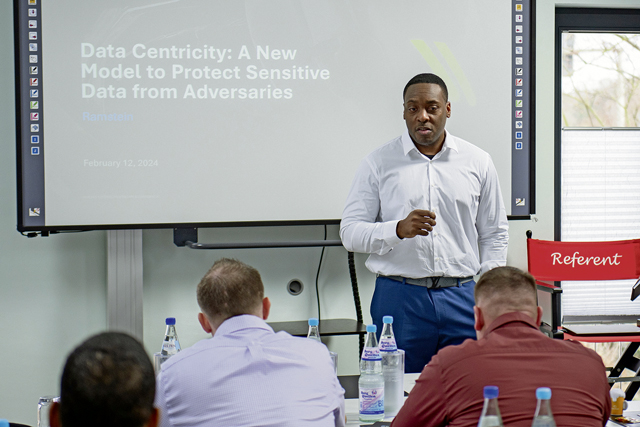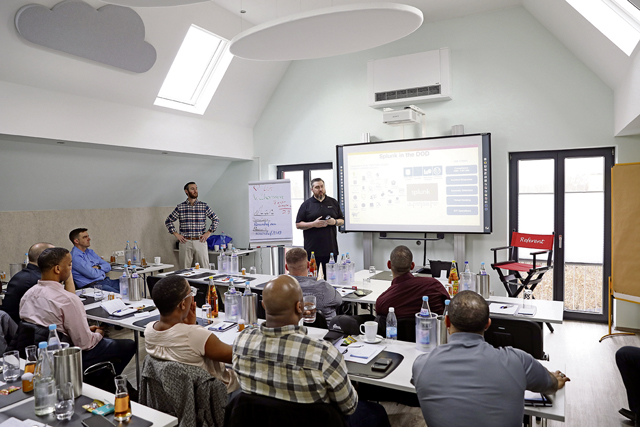
Signal warrant officers from the European theater gathered in Ramstein for the first 21st Theater Sustainment Command-led signal warrant officer professional development session from Feb. 12-13. The WOPD’s focus was to explore methods to implement the U.S. Army’s newest data centricity and zero trust plan slated to be in effect by 2027.
More than 20 signal warrant officers and contractors from 21st TSC, UR-AF, U.S. Army Network Enterprise Technology Command, 3rd Infantry Division and 2nd Theater Signal Brigade met to discuss what warrant officers do best: Provide technical expertise.
Col. Ernest Lane, 21st TSC chief of staff, said in opening remarks that warrant officers are champions of innovation, and the U.S. Army thrives on forward thinking and solutions.

“A lot of solutions are going to come out of this room from the people who are sitting in these seats,” said Lane. “That’s what warrant officers do. They’re out there, hunting for the next solution. They’re looking for the next problem to be able to solve. I see warrant officers as the type of leaders that look to solve their boss’ boss’ problems.”
Chief Warrant Officer 3 Randy Nkoulou, 21st TSC data operations warrant officer, and the WOPD’s lead planner, said it took about four months to plan this event. Nkoulou said the forum will help the 21st TSC and other units modernize how each organization uses data.
“Mentorship and retention are dear to my heart,” said Nkoulou. “I want them to know that they are technical experts. This setting shows warrant officers there are solutions out there to get to where we want to go, which is being modern, being flexible, and having data for all the users to use.”
The two-day event included guest speakers from Optiv + ClearShark, NetApp, Varonis, Splunk, Hewlett Packard Enterprise, Aruba Networks, and U.S. Army Signal Activity Kaiserslautern who shared best practices on how to recognize, transfer, store, shape, and manipulate data.

To help push the 21st TSC into the new century, Nkoulou said this forum will show how signal warrant officers can modernize sustainment operations to use new data driven technology.
“Sustainment has a lot of data,” said Nkoulou. “Before, we were focused on setting up the network and setting up applications for user. Now we have to say the most important thing the user needs is the data. We have to show the data to the boss, that data has to make sense, and we give the boss the ability to make decisions.”
Warrant Officer Chantal Tavitian, a systems technician warrant officer with the 1st Theater Personnel Operations Center, said she got a lot out of the WOPD as a newer warrant officer in the signal corps, and plans to incorporate what she learned into her daily duties.
“It comes down to networking and collaboration,” said Tavitian. “It’s nice to see what my fellow warrant officers are doing, and some of the free programs and software that they recommend using so I can learn more in depth about what my job is now that I’m in data analysis.”
More seasoned signal warrant officers, like Chief Warrant Officer 4 Jason Horton, the senior technical advisor to the 2nd TSB, said events like this WOPD are important for the signal warrant officer corps to sharpen their skills.
“Being a communications warrant officer is one of the most difficult crafts to have,” said Horton. “Technology changes every day. Having these types of forums helps us stay aligned with the industry, and seeing how they’re resolving problems enables us to integrate them in the military community.”
Horton said this WOPD helped signal warrant officers get an understanding of common problem sets, and how the industry is engaging these problems. By providing engineers the opportunity to network and communicate technical problems, Nkoulou said it drives home the point that signal warrant officers need to provide solutions to their home units to solve data centric problems.
“It requires signal warrant officers to shift their perception on how they are going to conduct business,” said Nkoulou. “We have to be trained to find solutions to put that data at the forefront of operations rather than what we’ve been normally doing.”


